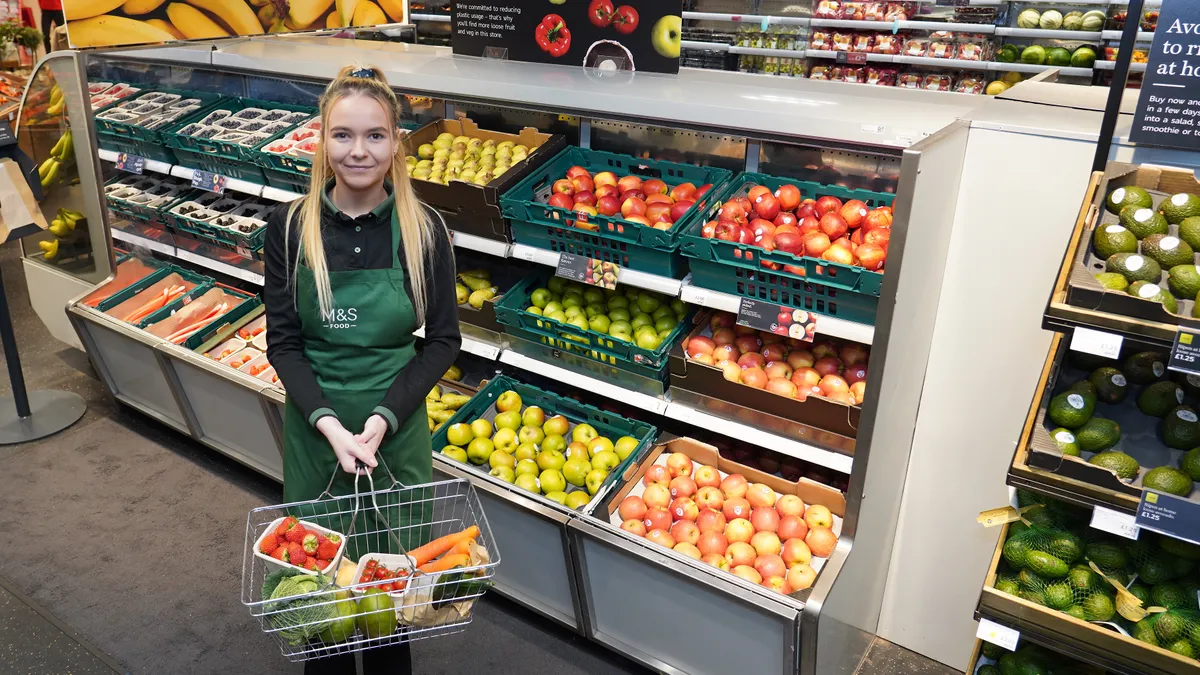Dive Brief:
- British retailer Marks & Spencer has opened a plastic-free produce department that includes 90 lines of fresh fruits and vegetables. Most selections, including hard fruits, are merchandised loose in traditional pallets while soft fruits and berries will be available in compostable containers. The three-month trial kicked off last week at the company's Tolworth store in suburban London, and will cut an estimated 580 tons out of its waste cycle over the next two years.
- Marks & Spencer removed sell-by dates from produce selections as part of the trial — an effort to reduce waste. The test will also introduce trained green grocers who can help customers select and weigh their products and provide tips to help curb food waste at home.
- Marks & Spencer aims to become a zero-waste business by 2025. It has removed 75 million pieces of plastic cutlery and straws from its foodservice business and by this spring it will have cut 1,000 tons of plastic packaging from its operations.
Dive Insight:
According to Euromonitor, increasing awareness of the impact of “ubiquitous plastic packaging” is a top-ten trend for the year ahead. As consumers decry straws, bags and and other plastic accessories they deem excessive, retailers and suppliers are moving to eliminate these items where it makes sense.
The elimination or reduction of packaging is increasing across all consumer-packaged goods. Like Marks & Spencer, many companies have set targets for making their products recyclable or reusable within the next several years. Nestlé announced its initiative earlier this month and will be rolling out paper packaging for some products as well as reducing PET content in its water bottles.
Nestlé and the others are responding to consumer demand. Euromonitor reported in 2017 that 15% and 18% of consumers say they will pay more for fresh food in environmentally conscious packaging or recyclable packaging.
Food retailers and restaurants account for a significant portion of food waste, research shows. ReFED, a nonprofit aimed at reducing food waste, reports that the U.S. retail food sector generates 8 million tons of food waste a year. The Environmental Protection Agency, meanwhile, estimates that containers and packaging make up 23% of landfill waste.
Going a step further, zero-waste stores are popping up across America. Stores like The Filling Station in New York, The Refill Shoppe in California, New Seasons Market and Zero Market in Denver encourage shoppers to bring in their own containers to purchase everything from bulk body and household liquids to olive oil, vinegar, salt and beer.
In 2017, Kroger announced a plan to eliminate all food waste and plastic bags by 2025, focusing on produce, meat and seafood departments. The grocer has also launched an initiative to expand its imperfect produce program to all its stores, and established a $10 million innovation fund to support food waste reduction programs. It's currently offering $1 million for the top ideas on how to reduce food waste across the company.
Consumers are paying attention to packaging, and retailers should realize that environmental messaging and recycling promotions alone won't solve the problem. Last month, more than 80,000 people signed a Change.org petition asking Trader Joe’s to reduce its reliance on plastic packaging. As more and more consumers start asking for change and are willing to pay more for sustainable practices, retailers should take a hard look at non-traditional solutions like the one Marks & Spencer is trialing.












